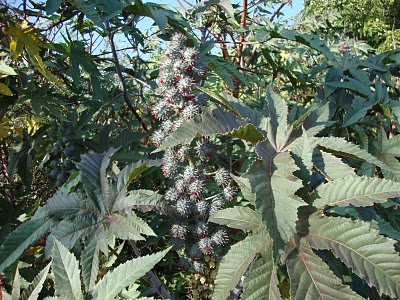
Agricultural News
Moratorium Likely on Production of Castor Beans By Oklahoma Board of Agriculture at Tuesday Meeting
Mon, 12 Dec 2011 05:31:51 CST
 After months of discussion within the agricultural community of the state- it appears that the Oklahoma State Board of Agriculture is on the verge of issuing a moratorium on the commercial production of castor beans in the state of Oklahoma, as the board anticipates that a law formalizing that position may be coming out of the 2012 legislative session.
After months of discussion within the agricultural community of the state- it appears that the Oklahoma State Board of Agriculture is on the verge of issuing a moratorium on the commercial production of castor beans in the state of Oklahoma, as the board anticipates that a law formalizing that position may be coming out of the 2012 legislative session.
On Saturday, Oklahoma State Secretary of Agriculture Jim Reese announced the board would consider that measure in their Tuesday board meeting, predicting the moratorium would be approved- Secretary Reese making that prediction to those in attendance at the Oklahoma Wheat Growers Annual Meeting held in Oklahoma City.
Earlier in 2011, it was announced that the Otoe-Missouria Tribe in Red Rock, Oklahoma had partnered with a group of out-of-state financiers to begin working on a project to grow 15,000 acres of castor beans and then convert them to biofuels. They have already purchased the grain elevator in Red Rock and would like to eventually operate 16 plants around the state, with 15,000 acres of castor beans in each area. Castor beans contain the toxin, Ricin, which is extremely dangerous and fatal if consumed, inhaled or injected.
Ricin is illegal to possess without a certificate of registration from the U.S. Department of Health and Human Services and has been used as a weapon worldwide since the 1940's. If found in wheat, soybeans or other food grains, ricin could cause an entire field, truck or elevator to be condemned. There are currently no regulations on the production, harvesting, hauling, storage or processing of castor beans in the state of Oklahoma.
Back at the end of summer- the Oklahoma Department of Agriculture, Food & Forestry (ODAFF) released proposed rules to establish a regulatory framework for the raising and harvesting of castor beans and the handling of equipment and land used in the production of castor beans. The goal of these rules was to create a "closed system", where no equipment, storage or land that comes into contact with castor beans is used for any other food or feed grain. However, agricultural groups and agribusiness in the state expressed grave concerns about the ability of the state to adequately establish this closed system with any degreee of integrity- and the call came from a variety of groups to simply ban commercial production of Castor in the state.
Click on the LISTEN BAR below to hear audio comments with both Jim Reese as well as state lawmaker Don Armes in regards to the likely action by the State Board of Agriculture on Tuesday.
WebReadyTM Powered by WireReady® NSI
Top Agricultural News
More Headlines...




















